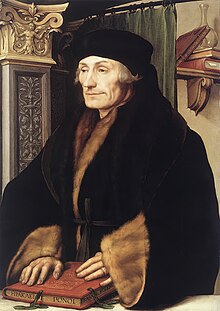Erasmism
Erasmianism was an ideological and aesthetic current within Renaissance humanism centered on the ideas of the Dutch Erasmus of Rotterdam (1466-1536).
Ideology
In ideological aspects, Erasmus advocates a concession between Protestantism and Catholicism. He criticizes the corruption of the clergy, especially that of the regular clergy, superstitious piety and the more external aspects of Catholic religiosity (worship of saints, relics, etc.) because he prefers an interior and spiritual religiosity, founded on mental prayer and inspired by the modern Devotio. On the other hand, through irenismo or pacifism he declares himself against wars, especially wars of religion and through Paulismo he wants to reinterpret the theology contained in Letters of Saint Paul in a more flexible sense. He is in favor of the existence of a temporary political power in Europe, which he identifies with the empire, and of another strong spiritual power represented by the pope. That is why the pope must leave temporal power in the hands of others.
In the philological field, Erasmus is in favor of eclectic imitation instead of Ciceronian imitation: the best style will be obtained by imitating the best of each Latin author, in instead of imitating only one: Marcus Tullius Cicero.
Dissemination
Supported by Emperor Charles V, Erasmianism had great prestige throughout Europe until tensions between Catholics and Protestants caused a general climate of suspicion towards the intellectual and religious currents that supported the reform of the Church and spirituality.
The key date for the introduction of Erasmus in Spain, where Erasmus had more influence than in any other country, including his, is the translation of Erasmus's books into Spanish from 1516-1517; Diego López de Cortegana made the first translation of one of his books into Spanish, the Querela Pacis. The Archdeacon of Alcor, Alonso Fernández de Madrid, canon of the Cathedral of Palencia, made a version of the Enchiridion or Manual of the Christian Knight that was printed in 1526, dedicated to the Archbishop of Seville and Inquisitor General Alonso Manrique. Luis Vives wrote to Erasmus in 1526 about the success of his translations in Spain:
- If you read them many, as you tell me what happens, you will remove the friars a lot from your old tyranny..
Its success was very rapid among the enlightened, the intellectuals and the humanists, but it did not have time to spread to the masses; in fact, it became a pressure group close to the Emperor, made up of the Juan de Valdés brothers and above all Alfonso de Valdés, whom some have come to call "more Erasmian than Erasmo", because of the combativeness with which he assumed his doctrine, as well as some prestigious humanists; but, after all, the vast majority had to leave Spain. The movement would have been strengthened if, as the Spanish followers of Erasmus claimed, the Dutch scholar had traveled to Spain; but his response to that invitation is well known: "non placet Hispania". He preferred to go to Germany; it is said that, later, he regretted his decision.
Some aspects of Erasmianism, according to Bataillon, became visible in the De los nombres de Cristo by Fray Luis de León and, even, in the renewal work of spirituality carried out by the Company of Jesus, because it was not in vain that Ignacio de Loyola was associated in his youth with the group of Miguel de Eguía, accused of Enlightenment, and read the Enchiridion.
Thanks to the Emperor, Erasmianism was able to overcome the consideration of heresy in 1527, when Carlos I, pressured by the Inquisition, convened a meeting of theologians in Valladolid, the Valladolid Conference, to debate about Erasmian ideas, which They considered themselves free from heresy. But the death of Erasmus, which occurred in 1536, determined that the dissemination of his works was prohibited in Spain and, when Archbishop Manrique died two years later, the rise of Erasmusism began a decided decline, although his literary traces did not completely disappear. or intellectuals, which can even be seen in Cervantes, whose teacher was a determined Erasmian, Juan López de Hoyos.
Followers
Erasmus had numerous followers in Europe, such as Thomas More or Guillaume Budé, and especially in Spain, where Erasmus' first translated work was published in 1516. Erasmus protected by Emperor Charles V, his ideas took root in the Castilian social sectors more dissatisfied with traditional religiosity: converts and followers of doctrines that are poorly known today, such as the enlightened or collected, developed independently of Erasmus. Erasmus corresponded with humanists of converso origin such as the Hellenist Juan de Vergara or the brothers Alfonso and Juan de Valdés; He was also a friend of the Valencian humanist émigré, also of Jewish-convert origin, Juan Luis Vives, and exerted a powerful influence on writers such as François Rabelais, Pero Mexía, Andrés Laguna or Miguel de Cervantes, in the latter through his teacher the humanist Lopez deHoyos. In Spain, for example, the Erasmian writers became a real pressure group in the environment of Emperor Carlos I of Spain and V of Germany, but when he retired to the monastery of Yuste and his son Felipe II began to govern, they fell in disgrace and the Inquisition persecuted every vestige of that form of Humanism. Juan de Vergara was arrested and Juan Luis Vives and the Valdés brothers had to emigrate to Europe.
Novels such as Lazarillo de Tormes, by an unknown author, were influenced by the erasmian currents.
Contenido relacionado
Halloween
Mexica religion
Imre lakatos
